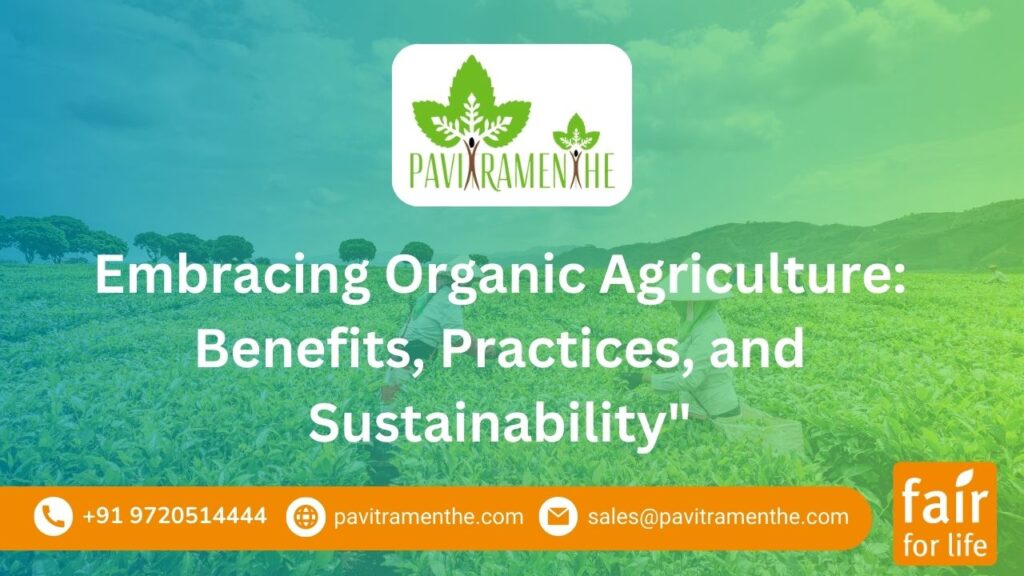Reduces Greenhouse Gas Emissions
it typically involves lower energy consumption and reduced greenhouse gas emissions. This is due to the avoidance of synthetic fertilizers and the use of natural farming techniques.
Crop Rotation: Crop rotation is an essential practice in organic agriculture. It involves changing the types of crops grown in a specific area from one season to the next, preventing the depletion of nutrients from the soil, and reducing the risk of pest and disease buildup.
Composting: Composting is the process of recycling organic matter like kitchen waste and crop residues into nutrient-rich humus. This improves soil structure and enhances its ability to retain moisture and nutrients.
Natural Pest Control: Organic farmers use natural methods for pest control, such as introducing beneficial insects, using trap crops, and employing companion planting to deter pests.
Avoidance of Synthetic Chemicals
Synthetic pesticides: herbicides, and fertilizers are strictly avoided in organic farming. Instead, natural alternatives like neem oil and pyrethrin are used.
The Certification Process: For a farm or a product to be certified as organic, it must adhere to specific guidelines and standards set by organic certification bodies. These standards ensure that organic practices are maintained, and consumers can trust the organic label.
The Future of Organic Agriculture: The future of organic agriculture is promising. As consumers become more aware of the benefits and environmental consequences of their food choices, the demand for organic produce is expected to grow.
The Rise of Organic Agriculture: In recent years, there has been a significant surge in the popularity of it. As more and more consumers become conscious of the food they consume, the demand for organically grown produce has grown substantially.
Also Read: Organic Product
What is Organic Agriculture: it is a sustainable farming method that relies on natural processes, biodiversity, and ecological balance. It focuses on maintaining soil health, reducing the use of synthetic chemicals, and promoting sustainable farming practices.


Healthier Food Options: One of the primary reasons for choosing it is the production of healthier and safer food. Organic farming avoids the use of synthetic pesticides, herbicides, and genetically modified organisms (GMOs), resulting in produce with fewer chemical residues.
Environmental Sustainability: Organic farming practices are inherently sustainable. They reduce soil erosion, enhance soil fertility, and minimize water pollution by avoiding the use of harmful chemicals. This helps in preserving the environment for future generations.
Biodiversity Preservation: Organic farms often promote biodiversity by avoiding monoculture farming. This approach supports a wide range of plants and wildlife, contributing to a healthier and more balanced ecosystem.
Improved Soil Health: it emphasizes building and maintaining soil health. Through practices like crop rotation, cover cropping, and composting, organic farmers ensure that the soil remains fertile and resilient.
Reduces Greenhouse: it typically involves lower energy consumption and reduced greenhouse gas emissions. This is due to the avoidance of synthetic fertilizers and the use of natural farming techniques.
Organic Farming Practices
Crop Rotation: Crop rotation is an essential practice in organic agriculture. It involves changing the types of crops grown in a specific area from one season to the next, preventing the depletion of nutrients from the soil, and reducing the risk of pest and disease buildup.
Composting: Composting is the process of recycling organic matter like kitchen waste and crop residues into nutrient-rich humus. This improves soil structure and enhances its ability to retain moisture and nutrients.
Natural Pest Control: Organic farmers use natural methods for pest control, such as introducing beneficial insects, using trap crops, and employing companion planting to deter pass
Synthetic Chemicals: Synthetic pesticides, herbicides, and fertilizers are strictly avoided in organic farming. Instead, natural alternatives like neem oil and pyrethrin are used.
The Certification Process: For a farm or a product to be certified as organic, it must adhere to specific guidelines and standards set by organic certification bodies. These standards ensure that organic practices are maintained, and consumers can trust the organic label.
Challenges of Organic Agriculture:it offers numerous benefits, but it also comes with some challenges. These include higher labor costs, lower yields in the short term, and the need for more skilled labor.
The Future of Organic Agriculture: The future of it is promising. As consumers become more aware of the benefits and environmental consequences of their food choices, the demand for organic produce is expected to grow.
Conclusion: it is more than just a farming practice; it’s a commitment to healthier, more sustainable food production. we not only support our health and well-being but also contribute to a greener, more sustainable planet.
it is more than just a farming practice; it’s a commitment to healthier, more sustainable food production. By embracing organic agriculture, we not only support our health and well-being but also contribute to a greener, more sustainable planet.

